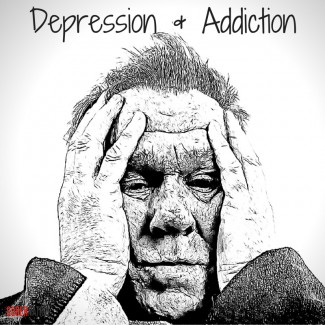Depression and Addiction: What to Do about Dual Diagnosis
Depression and addiction can occur together – a dual diagnosis. For a recovering addict like myself, the hopelessness that always followed me was confusing—am I depressed or coming down from the high? Which came first, the depression or the addiction/hangover?
Depression and Addiction: What Is a Dual Diagnosis?
The National Alliance on Mental Illness reports that a third of all alcohol abusers and more than half of all drug users experience mental illness symptoms of some kind. This is called a dual diagnosis, and either condition can develop first. But, research shows that drugs and alcohol only make the symptoms of a mental health condition worse. Substance abuse can also lead to new mental health problems because of the effects drugs have on our moods, thoughts, behaviors, and brain chemistry.
Why Addiction?
 I justified drug use and drinking because of an empty feeling about life. Addictive chemicals and behaviors flood the brain with dopamine, which makes us feel good. Some substances release 2-to-10 times the amount of dopamine that natural rewards do, like eating or sex. We become conditioned to these larger dopamine surges, which only drugs or alcohol can provide, and we reduce our ability to experience any kind of pleasure.
I justified drug use and drinking because of an empty feeling about life. Addictive chemicals and behaviors flood the brain with dopamine, which makes us feel good. Some substances release 2-to-10 times the amount of dopamine that natural rewards do, like eating or sex. We become conditioned to these larger dopamine surges, which only drugs or alcohol can provide, and we reduce our ability to experience any kind of pleasure.
The Journal of Neuroscience found that a drug abuser’s brain can recover its capacity for dopamine production and transportation, but it takes about 14 months. Once we get sober, what can we do while our brain heals outside of professional help?
Addiction and Depression Dual Diagnosis: Find Support
In addiction and in depression, I felt entirely alone. It’s essential to keep a network of people around me that I trust, who I can confide in when I have a craving or I feel that emptiness taking over. Recovery meetings are great venues to meet sober supports who are riding the same emotional rollercoaster—whether they be twelve-step meetings, SMART recovery meetings, Women for Sobriety groups, or otherwise. Some of these groups help me develop spirituality. I find strength in the shared pain at these meetings, and there are possibilities for growth in our willingness to be vulnerable with each other. On my worst days, I always have someone I can call.
With Addiction and Depression Exercise Matters
Our body releases endorphins when we exercise, which are neurochemicals that are structurally similar to morphine—a natural painkiller. Endorphins can bring on a euphoric feeling, interrupting a craving or a bad day. As we exercise more, we also build self-esteem, motivation, and confidence.
Medication for the Dual Diagnosis of Depression and Addiction
Meditation is a practice in mindfulness—remaining present in the moment and paying attention to your own thoughts. You can meditate sitting, lying down, walking, or running, just find a way to get your brain to a state of awareness where you no longer are worrying about what happened earlier or what you need to do later. Meditation, specifically, has some amazing effects on the brain: growth in areas of the brain that govern emotion regulation and decreased cell volume in the amygdala, which is responsible for our fear, anxiety, and stress. These brain changes were coupled with improved mood and general wellbeing.
Living Meaningfully with Depression and Addiction
There is no magic recipe for recovery, sobriety, or happiness. When I was depressed, nothing in my life mattered. The intense euphoria I eventually found in drugs seemed to give my life new meaning, until they stopped working and I could no longer find pleasure in anything. In sobriety, I try to fill my old void with what gives my life meaning. I have the honor of writing and doing work that I believe in. I go outside and connect with our beautiful planet. Finally, I surround myself with people who remind me that this life is a carnival.
The article was written by:
 Nadia Sheikh is a content writer and web developer for Sober Nation. She loves words, grapes, and outer space.
Nadia Sheikh is a content writer and web developer for Sober Nation. She loves words, grapes, and outer space.
To be a guest author on the Your Mental Health Blog, go here.
APA Reference
Author, G.
(2016, May 13). Depression and Addiction: What to Do about Dual Diagnosis, HealthyPlace. Retrieved
on 2025, November 29 from https://www.healthyplace.com/blogs/yourmentalhealth/2016/05/depression-and-addiction-what-to-do-about-dual-diagnosis
Author: Guest Author
As distinct from from professional doctrine and literature, dual diagnosis is more practical issue that pertain to psychiatric patient and their circumstances where they live and work. In daily work up of clinical psychiatrist the simultaneous event of addiction and depression is common experience than exclusion case. But this remark is often neglected by doctors and patients that seriously compromise the definitive treatment and recovery of alcohol and any other drug addictions. It means that alongside treatment of any addiction entity the treatment of depression indicates crucial step and help to patient with dual diagnosis. Antidepressant are the first approach in successful psychiatric treatment, whereas psycho-social intervention take place on satisfying recovery of this delicate category of psychiatric patients. It is og crucial importance to return the life performances by systematic and meaningful effort during longtime and tiring process of psychiatric treatment and management of patients with addiction problems. Active and everyday participation of this category of patient in social life exhibits substantial therapeutic tool and help. Your genuine experience confirm this statement in illustrate way.
Why is there no mention of DDA ( dual diagnosis anonymous)? I am a long time member of AA and have recently started a DDA group to help with the underlying causes of addiction.